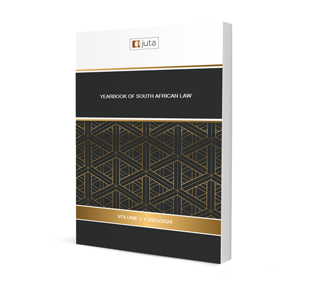Authors Elsabé van der Sijde, Zsa-Zsa Boggenpoel, Sameera Mahomedy
ISBN: 978 148515 163 0
Affiliations: LLB (Stell) LLM (UP) LLD (Stell); Research Fellow, Department of Public Law, Stellenbosch University; LLB LLD (Stell); Professor, Department of Private Law, Stellenbosch University; LLB LLM LLD (Stell); Senior Researcher (Law and Policy) at the SAMRC/Wits Centre for Health Economics and Decision Science – PRICELESS SA, School of Public Health, Faculty of Health Sciences, University of the Witwatersrand
Source: Yearbook of South African Law, Volume 5, p. 928 – 972
